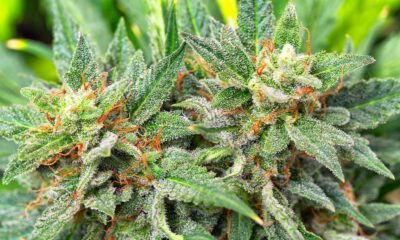
Joint Opinions
How Marijuana Legalization Keeps Law Enforcement Honest
Analysis shows fruitless police searches are reduced and trust in police is increased when cannabis is legalized.
Earlier this month, video footage of police in Bolivar, Missouri searching the hospital room and possessions of a cancer patient for cannabis — cannabis that turned out not to exist — went viral, and did so for a few reasons.
There was the spectacle itself: Three uniformed and armed police officers, in a town with a violent crime rate higher than the state average, not only bothering to respond to someone calling them reporting a weed smell, but actually going through with the search. This wasn’t going through the motions; they were trying to find weed that, like Saddam’s WMDs, was not there.
Then there was the familiarity of the spectacle. Turns out police rifling through your stuff looking for something they can ring you up on — a humiliation, an indignity, an abuse of power and, quite often, a colossal waste of time — is something people can relate to.
In the Bolivar case, a hospital security guard phoning police to report a marijuana smell triggered a search. In other states, police need only believe they smell cannabis in order for a warrant-less search to become legal, a standard upheld recently by the Kansas Supreme Court.
The obvious preventative measure is to legalize marijuana, but as the Cato Institute recently pointed out — yes, the Koch brothers’ libertarian think-tank — the effects of marijuana legalization are felt in instances even when marijuana is not involved. There is a strong case to be made for legalizing cannabis as a way to rebuild trust in police, who in turn should have an easier time doing their jobs.
Beyond the War on Drugs?
As data crunched by the Stanford Open Policing Project demonstrated, highway searches of all kinds plummeted in Washington and Colorado after voters in those states legalized marijuana.
The takeaway is that marijuana remains a “major justification used by police to stop motorists,” as NBC News observed. This implies the presence of cannabis is a pretext for police to search a vehicle or an individual, be the cannabis real, perceived or applied later as post-facto justification.
That conclusion — search now, say you believed there was marijuana present later — is not likely to make police watchdogs any happier. Nor will the conduct in Bolivar.
But the utility of marijuana legalization as a broad social justice tool can and should regularly feature in the marijuana legalization debate, even in a way beyond righting the wrongs of the drug war, creating jobs, or raising tax revenue.
Because not only does fewer pretext for searches keep police honest, it makes their jobs easier.
“Searches where you don’t find something are really negative towards a community,” Jack McDevitt, director of the Northeastern University Institute on Race and Justice, told NBC News. “Have a police officer search your car is really like, ‘Why are they doing this to me?’ And you get more pissed off. If you’re trying to do relationship building, it’s not a good thing to do a lot of searches.”
Police do seem to know this, even if they are slow to admit or to adjust. Marijuana legalization “will change the way we do our job,” James Batelli, chief of police in the college town of Mahwah, New Jersey, told NorthJersey.com.
There is ample evidence that the public continues to be annoyed and alienated at overzealous police. Evidence of just how popular marijuana remains as a pretext for police to conduct searches can be seen in Ohio highways leading to Michigan, where some patients accuse cops of snaring them in roadside “weed traps.”
That, in turn, is compelling a state lawmaker to introduce legislation decriminalization possession of small amounts of cannabis for all adults.
It is true that quantifiably unjust police practices do not require marijuana to be legalized in order to end. After all, it was a series of lawsuits that ended New York’s notorious practice of “stop and frisk,” in which police had near-free reign to detain and search mostly young men and boys of color, nearly 90 percent of whom were completely innocent of wrongdoing.
But, as the episodes above demonstrate, it helps.
TELL US, have you ever been stopped and searched by the police?


























